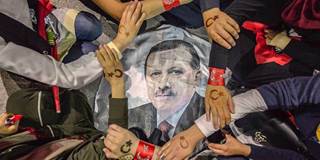Ever since Turkish President Recep Tayyip Erdoğan won his first general election in late 2002, he has been obsessed with the idea that power would be wrested from him through a coup. That obsession helps explain the widening repression and rapid descent into lawlessness since July's failed putsch.
CAMBRIDGE – Ever since Turkish President Recep Tayyip Erdoğan won his first general election in late 2002, he has been obsessed with the idea that power would be wrested from him through a coup. He had good reason to worry even then. Turkey’s ultra-secularist establishment, ensconced in the upper echelons of the judiciary and the military at the time, made no secret of its antipathy toward Erdoğan and his political allies.

CAMBRIDGE – Ever since Turkish President Recep Tayyip Erdoğan won his first general election in late 2002, he has been obsessed with the idea that power would be wrested from him through a coup. He had good reason to worry even then. Turkey’s ultra-secularist establishment, ensconced in the upper echelons of the judiciary and the military at the time, made no secret of its antipathy toward Erdoğan and his political allies.